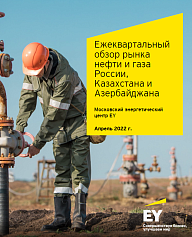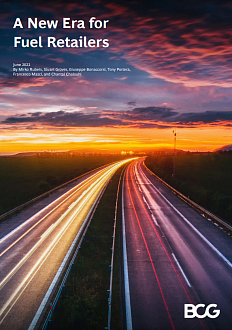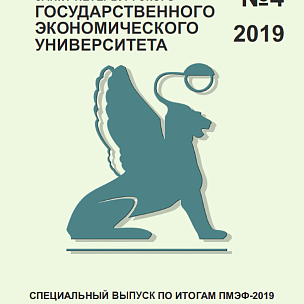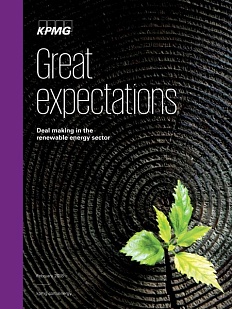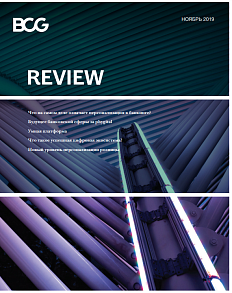The publication by EY contains an analysis of key macroeconomic and industry-specific trends in the oil and gas sector in Russia, Kazakhstan, Azerbaijan, and globally.
The Roscongress Foundation presents the salient points of the publication accompanied by fragments of broadcasts of relevant panel discussions from the business programme of international events held by the Roscongress Foundation.
Economic growth and business activity decline in Russia, Kazakhstan, Azerbaijan, and globally.
Despite a rise in business activity in March and occasional revival in some countries (for example, in the US), growth rates continued to slow down in the first quarter of 2022. PMI Composite index which reflects changes in manufacturing and the service sector decreased from 53.5 in February to 52.7 in March, while the Food Price Index showed a shocking growth of +33.6% year-on-year. This was the result of further supply chain disruptions caused by the pandemic, including a recent deterioration in the epidemiological situation in China and a major lockdown in Shanghai. Other negative factors were the rising geopolitical tension and mounting inflationary pressure. The EY analysts note that economic forecasts at the moment are characterized by considerable uncertainty, with a high risk of global growth rates declining in 2022 and inflationary pressure increasing over the next two years. Some organizations have already revised downwards their global GDP forecasts.

In Russia, too, the PMI Composite index dropped from 50.8 in February to 37.7 in March, while the PMI Manufacturing index fell to the lowest value since May 2020 (44.1 in March). Importantly, the Ministry of Finance and the Ministry of Economic Development project a 10% decrease in Russias GDP year-on-year. Also, according to estimates by the Center for Strategic Research, there will be a rise in unemployment which will reach 7.1 to 7.8% by the end of 2022. Business activity in Kazakhstan declined too. The PMI Manufacturing index was 46.8 in March, compared to 50.1 a month earlier. The Government has adjusted downwards its GDP growth forecast for the year (from 3.9% to 2.1%). In Azerbaijan, despite the fact that the countrys GDP in the first quarter of 2022 was 30.37 bn manat, which is 6.8% greater than in the same period of 2021, the Government also projects a weaker GDP growth (3.9% in 2022 compared to 5.6% in 2021).
Oil and gas output increased, and so did the prices.
The authors of the report note that in the current geopolitical context the price for Brent oil increased by 38%, from USD 80 to USD 110 a barrel, with a three-months average of USD 90. Gas spot prices at the Dutch TTF in the first quarter of 2022 soared nearly fivefold year-on-year, averaging USD 32 per million BTU. In early March, quoted prices exceeded USD 80 per million BTU.
Importantly, after Russia increased its output of oil and gas condensate in the first quarter of 2022, the pressure of the geopolitical situation started to be felt in March. For example, daily output of liquid hydrocarbons was roughly 11 million barrels, which is 7.3% more than in March 2021, but 0.5% less than in the previous month. Gas production in Russia over the period from January to March 2022 increased by 0.9% compared to last year, despite the fact that gas exports to far-abroad countries over three months declined by 27% compared to last year. In Kazakhstan, oil and gas condensate output in the first quarter of 2022 was also 7.6% higher than in the same period last year. In Azerbaijan, oil production increased by 1.8% compared to February but was 5.2% lower than in the same period of 2021.
In the current context, Russia is faced with a number of challenges related to the geopolitical situation and the need to optimize oil production, refining, marketing, and servicing, as well as with a range of restrictions in the gas industry.
EY analysts state that geopolitical challenges are currently at the top of the agenda in Russias oil and gas sector. These challenges include restrictions on foreign funding in the industry and international companies participation in projects, the need for import-substituting technologies, and the necessity of forming new production and logistics chains. Apart from this, the authors of the report mention taxation in the oil and gas sector, oilfield servicing, and exploration drilling. Concerning the issues in Russias gas industry, the experts highlight the need to convert payments for gas exports to rubles, halted certification of the Nord Stream 2 gas pipeline, and EUs restrictions on importing equipment into the country. As for global energy market, the key concerns are threatened competitiveness of European metals industry, problems in the coal industry, and climate agenda.
Gain more insights about the power industry and the oil and gas sector in the Oil and Gas, Exploration and mining, and Power generation sections of the Roscongress Information and Analytical System.


